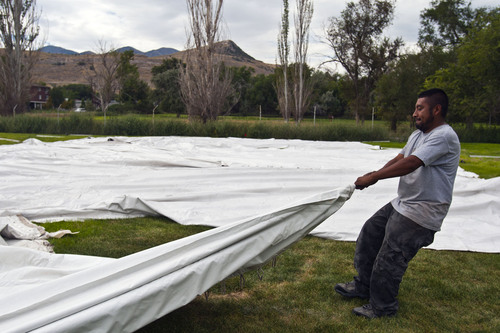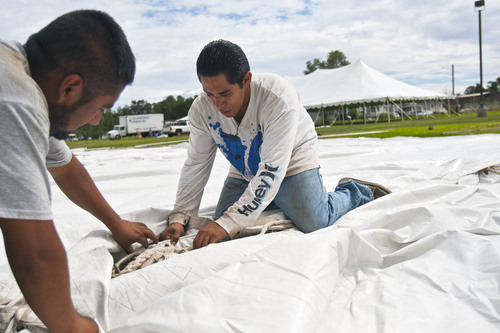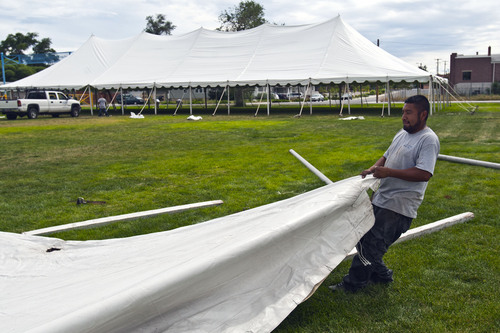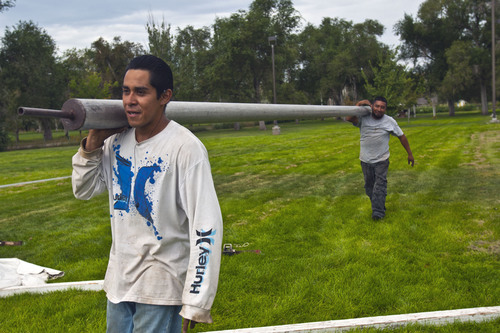This is an archived article that was published on sltrib.com in 2013, and information in the article may be outdated. It is provided only for personal research purposes and may not be reprinted.
Trent Webb has never been a member of a labor union, but when the six employees of his newly formed asphalt recycling company approached him earlier this year about organizing under the banner of the International Union of Operating Engineers, he didn't stand in their way.
For a small company such as Road Recycling, there are benefits to having a unionized workforce, he said.
"A lot of people have told me I'm stupid," Webb said. "But when I looked at the numbers, the cost differential [between operating with a union versus a nonunion workforce] wasn't that much. And it is a way to provide my employees with health insurance and pension benefits — issues the union has to deal with now and I don't."
Although the organizing effort at the Utah-based Road Recycling was amicable, it was the exception rather than the rule in the state.
Labor unions in Utah have been under siege for years with business owners and corporate operators often resisting efforts by their employees to form unions, fearing that an organized labor force will cut into their profits and give the workers too much say in their operations.
The result: Utah workers covered by collective bargaining agreements steadily eroded from 6.2 percent a little more than a decade ago to just 5.2 percent today. That places Utah 43rd in the nation in the percentage of unionized workers, well below the top states such as New York, where more than 23 percent of workers are affiliated with labor unions, and Alaska and Hawaii at 22 percent.
Organized labor, though, is fighting back. Several of the state's largest unions — the United Steelworkers of America, the International Brotherhood of Teamsters and the Operating Engineers — are reporting recent successes with their organizing efforts. They are hopeful about the future.
"In the past three years we've had more success [in each of those years] than in any of the 20 years that I've been with the Steelworkers," said Wayne Holland, the international staff representative for the United Steelworkers of America, which counts more than 3,000 Utahns among its rank and file.
He suggested that the prolonged downturn and weak economic recovery that has squeezed workers' wages and benefits are playing a role in the renewed success.
Holland noted that three weeks ago, the USW signed a collective bargaining agreement with Clean Harbors, which offers industrial and household hazardous waste disposal at its plant in Tooele. The newly created bargaining unit at the plant represents some 110 workers, with those participating in the election voting 79 to 11 to affiliate with the union.
"It was a hard campaign. The company was real aggressive. But we won by a pretty big margin," Holland said.
Under the new labor agreement with Clean Harbors, USW members will see their wages increase 3 percent annually for the next six years, or an 18 percent increase overall, Holland said. "Over the past six years they hadn't gotten any raises at all."
The company was not available for comment.
Rusty Hart, president and business agent of the Brotherhood of Teamsters Local 222 that represents about 3,300 Utah workers, said the union earlier this year successfully organized approximately 20 employees at Ryder Truck Rental in Salt Lake City.
"It was our second attempt at organizing them," Hart said. "We tried a little over three years ago and got turned down, but this time it was different."
Organizing a workforce almost always is an uphill battle, he said.
To win a certification election, a union has to win by 50 percent plus one vote, Hart said. "If we get the opportunity to present our side of the story to enough people then we have a real chance at being successful. But most of the time the advantage is with the company."
Unions can't organize without at least some of the people at a company getting involved, Hart said, adding that what usually happens is that someone will contact the union and ask for help organizing. "Then it becomes a matter of education," he said.
Hart said typically once a company finds out there is an organizing effort underway, it will begin holding meetings of its own with its workers. "They are at an advantage then. They can say almost anything they want — like all unions want are their dues and that they really aren't going to look out for the workers. And they'll point out that no one can force them to sign a contract."
The best that unions like the Teamsters can do is invite a company's employees to come over to the union hall, he said.
"Sometimes it is hard getting people to come to listen to our message," Hart said. "Sometimes people are afraid ,and there are almost always some who will never support a union no matter what."
Utah AFL-CIO president Dale Cox said such organizing efforts represent a continuation of the century-and-a-half-long battle by organized labor for worker rights.
"The general public will have a day off on Monday, and that is entirely due to organized labor," he said. "All the holidays that workers now enjoy and have off — their paid vacations and safer workplaces — it all can be traced back to the battles won by the labor movement over the past 20, 30, 40, 50 years. And if we lose sight of that, we could end up losing those benefits that so many worked so hard to gain."









